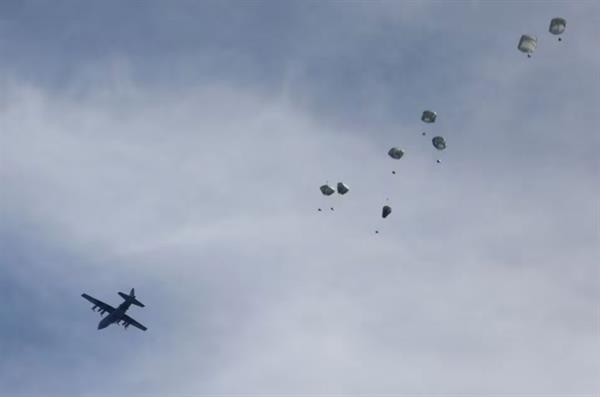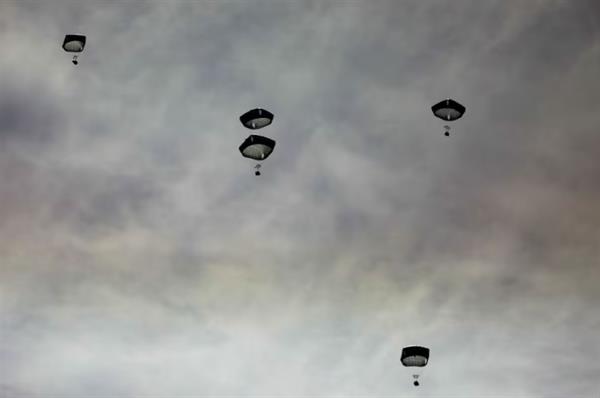Biden says US military to airdrop food and supplies into Gaza.
President Biden announces first U.S. military airdrop of aid into Gaza amid humanitarian crisis; Israel aware and supportive. Gaza facing famine.
WASHINGTON, March 1 - President Joe Biden announced plans on Friday to conduct the first military airdrop of food and supplies into Gaza. This decision comes in the wake of the deaths of Palestinians who were waiting for aid, bringing attention to the unfolding humanitarian crisis in the densely populated coastal area.
Biden stated that the U.S. airdrop would occur in the coming days but did not provide specific details. Other countries, such as Jordan and France, have already conducted airdrops of aid into Gaza.

Related Image: © Reuters
"We need to do more, and the United States will do more," Biden told reporters, emphasizing that the current aid reaching Gaza is insufficient. White House spokesperson John Kirby highlighted that airdrops would be part of a sustained effort, with the initial drop likely consisting of military MREs (meals-ready-to-eat).
"This won't be a one-time event," Kirby stated. Biden also mentioned that the U.S. is exploring the possibility of a maritime corridor to deliver larger quantities of aid to Gaza.
Officials indicated that the airdrops could start as early as the upcoming weekend. According to the U.N. Office for the Coordination of Humanitarian Affairs, at least 576,000 people in Gaza, a quarter of the population, are on the brink of famine.
The situation has become increasingly dire for Palestinians nearly five months into the conflict that began with a Hamas attack on Israel on Oct. 7. Gaza health authorities reported that Israeli forces had killed over 100 people attempting to reach a relief convoy near Gaza City early on Thursday.
Israel attributed most of the deaths to crowds around aid trucks, stating that victims were trampled or run over. An Israeli official mentioned that troops had fired on crowds they deemed threatening in a limited response.
With reports of people resorting to eating animal feed and cactuses to survive, and medics reporting children dying in hospitals from malnutrition and dehydration, the U.N. faces significant challenges in delivering aid.
While the type of aircraft for the airdrops is unclear, the C-17 and C-130 are considered suitable for the task. Retired U.S. Air Force three-star general David Deptula expressed confidence in the U.S. military's ability to execute airdrops effectively.
"There are many detailed challenges, but none are insurmountable," Deptula told Reuters.
The U.S. and other countries anticipate that a temporary ceasefire could facilitate aid delivery. Biden expressed hope for a ceasefire by the start of Ramadan, which begins on March 10.
Questions have arisen about the effectiveness of air-dropping aid in Gaza. A U.S. official, speaking anonymously, stated that the airdrops would only have a limited impact on Gaza's suffering as they do not address the root cause. The official added that only opening up land borders could truly address the issue.

Related Image: © Reuters
Another concern is ensuring aid does not end up in the hands of Hamas, given the lack of U.S. troops on the ground. Richard Gowan, the International Crisis Group's U.N. Director, described airdrops as good photo opportunities but a lousy way to deliver aid. He argued that aid convoys following a truce would be more effective.
The Biden administration is considering shipping aid by sea from Cyprus, approximately 210 nautical miles off Gaza's coast. Kirby acknowledged the challenges of airdropping aid into Gaza due to its dense population and ongoing conflict.
Israel, which has been urged by the U.S. to allow more aid into Gaza, has attempted its airdrops. An Israeli official in Washington stated that Israel was aware of the U.S. humanitarian airdrop and supported it.
Biden's announcement of aid to Gaza was marred by gaffes, as he twice confused it with Ukraine. The U.N. delivered aid to besieged northern Gaza for the first time in over a week, providing medicines, vaccines, and fuel to al-Shifa hospital in Gaza City.
The World Food Programme had paused food aid deliveries to northern Gaza until conditions allowed for safe distribution. UNRWA reported that in February, an average of nearly 97 trucks entered Gaza each day, below the target of 500 per day.